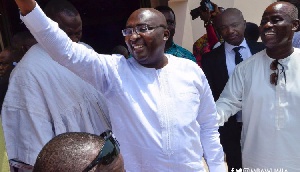 Vice President Dr. Mahamudu Bawumia
Vice President Dr. Mahamudu Bawumia
Vice President Dr. Mahamudu Bawumia’s recent comments that Ghana’s economy is built on strong fundamentals have received vindication from Standard and Poor’s (S&P) Global Ratings.
Dr. Bawumia while speaking at a Student’s Entrepreneurship Initiative programme in Tamale dismissed the minority’s concerns that the recent marginal depreciation of the cedi was occasioned by weak economic fundamentals.
Examining economic data of the recent past, the Vice President argued that low inflation, reduction of debt to GDP ratio, declining interest rates, increased growth rate, increased manufacturing and agricultural growth among other economic indicators showed that the Ghanaian economy was doing relatively well.
Dr. Bawumia asserted that the 7% depreciation of the cedi was the second lowest since 2012 and that this cannot be evidence of weak economic fundamentals.
The minority NDC was adamant in accepting Vice President Dr. Bawumia’s analysis. Deputy Minority leader James Avedzi and MP for Ketu North rejected Dr. Bawumia’s argument that the economy was doing well.
However, a 12-page report by the credit rating agency, S&P Global Ratings, published on 14th September, 2018, showed Ghana’s economic performance improved which resulted in Ghana being upgraded from B- to B.
It is stated in the report that “S&P Global Ratings raised its long-term foreign and local currency sovereign credit ratings on Ghana to ‘B’ from ‘B-‘”.
The reputable credit rating agency added that Ghana’s “outlook is stable”.
“We could lower our ratings if Ghana’s economic growth is significantly lower than we expect and if its policymaking effectiveness were to weaken, for example if fiscal deficits were to be materially larger than our expectations. We could consider raising our ratings if Ghana implements and adheres to measures that materially alleviate pressures on public finances and reduce public debt levels beyond our expectations. We could also see prospects for an upgrade if the current account deficit narrows faster than we expect and external debt and gross external financing needs are significantly reduced,” the report indicated.
In justifying the rational for the new upgrade, the report mentions among others that “the upgrade reflects our assessment that Ghana’s monetary policy effectiveness has improved, albeit from a low base, and will support the credibility of the inflation-targeting framework over the period.
“Having peaked at a seven-year high of 19.2% (year-on-year) in March 2016, headline inflation has continued to decline to 10% by mid-year 2018, supported by a relatively tight monetary policy stance. In our view, the Bank of Ghana’s (BoG) policy rate has also been fairly effectively transmitted through the financial system to market participants. The government’s recapitalization of the banking system in 2018 is a fiscal expense weighing on our fiscal assessment, but should ultimately strengthen the banks and allow them to support financial intermediation in the economy.
“The ratings are supported by our monetary policy assessment and our view of Ghana’s fairly robust economic growth prospects. The ratings remain constrained by weak public finances from both a stock and flow perspective, sizable contingent liabilities, the country’s low GDP per capita, and high external debt levels”.
The verdict by S&P Global ratings seems to have settled the debate on the economy in favor of the ruling New Patriotic Party Government. It is a vindication of Vice President Bawumia, who has maintained that the economy is better managed today than two years ago.